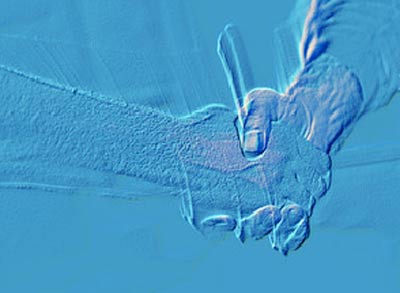(单词翻译:单击)
情景对话
Tom: Are you a teacher here?
汤姆:你是这里的老师吗?
Martin: No I'm not, I'm actually a graduate student.
马丁:不是,我是一名研究生。
Tom: Oh right.
汤姆:哦,好。
Martin: My name is Martin.
马丁:我叫马丁。
Tom: Hi.
汤姆:你好。
Martin: Hi how are you?
马丁:你好。
Tom: I'm Tom.
汤姆:我是汤姆。
Martin: Nice to meet you Tom.
马丁:汤姆,很高兴见到你。
Tom: Where are you from Martin?
汤姆:马丁,你来自哪里?
Martin: I'm from Seattle, Washington in the US.
马丁:我来自美国华盛顿州西雅图市。
Tom: Is that in the Northeast? Northwest?
汤姆:西雅图是在东北部吗?东北部吧?
Martin: Northwest. Right near Canada.
马丁:在西北部。离加拿大很近。
Tom: Is it cold up there?
汤姆:那里冷不冷?
Martin: It's wetter than it is cold.
马丁:相比冷来说,那里经常下雨。
Tom: How long have you been in Japan.
汤姆:你来日本多长时间了?
Martin: I've been in Japan for about 6 months.
马丁:我来日本大概有6个月的时间了。
Tom: And what are you studying?
汤姆:你学什么专业?
Martin: I'm studying international cooperation and economics and nationalism in Northeast Asia.
马丁:我学习东北亚国际合作、经济以及民族主义。
Tom: Is that a master's level or a Ph.D.?
汤姆:这是硕士学位还是博士学位?
Martin: Master's level.
马丁:硕士学位。
Tom: Right. How long is the course?
汤姆:好,课程为期多久?
Martin: Oh, it's about 2 years so I'll be done in another year.
马丁:哦,大概要上两年,我再有一年就能拿到学位了。
Tom: So you're fairly settled here then?
汤姆:所以你已经在这里定居了吗?
Martin: By and large, yes. How about you?
马丁:基本上是这样。你呢?
Tom: I'm from the UK. Actually I'm a teacher here. I'm not studying.
汤姆:我来自英国。我不是学生,我在日本当老师。
Martin: Oh, how long have you been a teacher here?
马丁:哦,你在日本做老师多长时间了?
Tom: I just started this semester about 2 months ago.
汤姆:我是这学期开始在这里教课的,大概两个月以前吧。
Martin: Oh 2 months — very, very recent. How do you find Japan?
马丁:哦,两个月以前,就在不久前。你觉得日本怎么样?
Tom: It's brilliant. I really like it.
汤姆:非常好。我非常喜欢日本。
Martin: Have you been in Japan a long time or...?
马丁:你来日本很长时间了吗?还是……?
Tom: I was in Japan 4 years ago for 2 years. I've been trying to come back since I left.
汤姆:四年前,我曾在日本待了两年的时间。我离开后又回到了这里。
Martin: I find Japan very, very, very nice. The environment is very nice.
马丁:我觉得日本非常非常好。这里的环境很好。
Tom: I mean this is quite a small city...
汤姆:这是一个非常小的城市……
Martin: I lived in Seoul for about 3 and a half or 4 years and it's nice to have a smaller cleaner city that's a little more laid-back, not so rush rush.
马丁:我在首尔生活过三年半,差不多四年的时间,在一个悠闲又干净的小城市生活非常好,不用那么匆忙。
Tom: So tell me about your day. What do you do in a day?
汤姆:跟我说说你的生活吧。你每天都做什么?
Martin: Generally pretty standard, you know, come up to campus in the morning, study, have class, and then read a little bit, go to the library, and then go back home and go off to work in Oita.
马丁:总的来说,我的生活非常普通,我早上去学校上课,然后去图书馆看书,之后回到家里,然后去大分市上班。
Tom: You work?
汤姆:你在工作吗?
Martin: Yeah, just in Oita for one or two days a week.
马丁:对,在大分市,每周上一到两天的班。
Tom: OK. Oh that sounds like a nice schedule.
汤姆:好。听起来安排得很好。
Martin: Yeah, how about you? You're here for how long a day?
马丁:对,你呢?你每天在这里的时间有多长?
Tom: Oh. I get the first bus up in the morning. It gets me here at about 8 o'clock. I have only 3 classes in a day so it's only, what, about four and half hours of teaching. The rest of the time is preparing the lessons, marking the homework, surfing the internet, using the library as well. And then I head home about 6 o'clock.
汤姆:哦,我赶早上第一班公交,大概8点左右到学校。我每天只有三节课,大概是四个半小时。其余时间我会备课,批作业,上网,也会去图书馆。之后我大概在6点钟左右回家。
Martin: Doesn't sound...well, a little busier but...
马丁:听起来……有一点儿忙,不过……
Tom: It's quite a relaxing schedule, not too intense. And getting home at 6 or 7, I've still got time for a swim or to cook something in the evening.
汤姆:这是一个非常轻松的安排,并不是太紧张。我大概6点或7点到家,所以我还有时间去游泳或是做晚饭吃。
Martin: Do you go to the club down there or...?
马丁:你是去健身房还是?
Tom: The public swimming pool next to the park.
汤姆:我去公园旁边的公共游泳池。
Martin: Ah, OK.
马丁:哦,好。
Tom: Have you been there?
汤姆:你去过那里吗?
Martin: No I haven't. But I've walked by there.
马丁:没有,没去过。我路过过那里。
Tom: Do you live in that part of Beppu?
汤姆:你是住在别府附近吗?
Martin: I live in Kanagawa so quite far away from everywhere else but it's nice and very, very quiet.
马丁:我住在神奈川,离所有地方都远,不过那里舒适又安静。
Tom: That seems like it's important to you.
汤姆:听起来这对你很重要。
Martin: As I get older, it gets more important, so.
马丁:随着我年龄的增长,这点变得越来越重要。

译文属可可原创,仅供学习交流使用,未经许可请勿转载
重点讲解
重点讲解:
1. laid-back 悠然自得的;放松随和的;
例句:Nothing worried him, he was really laid back.
他万事无忧,日子过得十分悠游自在。
2. by and large 大致上;总体上;总的说来;
例句:By and large, he is a kind, generous man.
总的说来,他是个仁慈、慷慨的人。
3. as well 也;还;
例句:The shop sells baubles as well.
这家商店也销售廉价珠宝。
4. next to 紧靠…旁边;在…近旁;贴近;
例句:The bank next to our school was raided last week.
我们学校附近的那个银行上周被人抢劫了。


